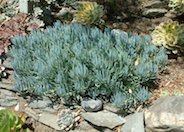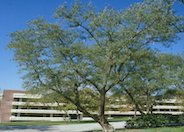
Common name:Thread Leaf Coreopsis
Botanical name:Coreopsis verticillata 'Golden Shower'
This bushy, full-branched perennial will grow 3' tall and 2' wide; it has threadlike leaves with clusters of yellow flowers that bloom in early summer and last until winter.

Common name:Huachuca Agave, Orange Century Plan
Botanical name:Agave parryi v. huachucensis
This Agave grows slowly to 2' by 2'. It is lump forming with dense rosettes. It has short gray leaves with dark thorns on the margins. This is the largest of the subspecies of parryi with leaves 2' long. It is native to parts of AZ and is more robust, with larger leaves and broader panicles and larger flowers than the species. It is primarily found in oak and pine woodlands.-Mountain States Nursery

Common name:Golden Toothed Aloe
Botanical name:Aloe X nobilis
This succulent perennial will only grow 1' tall and 1' wide. It has large, sharp, dark green leaves and clusters of red-orange flowers that bloom in summer.

Common name:Lindheimer's Muhly
Botanical name:Muhlenbergia lindheimer
Native to Mexico and Texas this stunning clump forming grass is winter dormant grass in cold climates, but usually semi-deciduous in mild climates. From the fall into winter emerge the 5 ft tall upright flower inflorescence, that rise well above the blue-gray foliage. The flowers are at first purple then mature to a gray color. Best in full sun with regular watering but will tolerate drought and light shade. -Randy Baldwin
San Marcos Growers

Common name:Trailing Lantana
Botanical name:Lantana montevidensis
Lavender flowers accent the trailing growth habit of this Lantana. It is excellent for spilling over walls or down banks. Eventually, it will reach about 2' tall by 6' wide; size is controlled by pruning and severity of winter. It does best in full sun and is drought tolerant. It grows rapidly, even in heat, smog and poor soil. It is cold hardy to 25 degrees F, but recovers quickly. Fruit is poisonous. Butterflies are attracted to Lantana.

Common name:Mexican Palo Verde, Jerusalem Thorn
Botanical name:Parkinsonia aculeata
The Mexican Palo Verde has prickly stems. This tree is very fast growing with sparse foliage and very long narrow leaves. Yellow flowers with orange red throats bloom sporadically. It is very messy, thorny, weedy and short-lived. This tree is usually found on limestone soils in areas with moisture but is strongly drought tolerant. It can withstand saline conditions. It can be cold or drought deciduous. It is beautiful in form being light and airy looking, with green bark.

Common name:Matilija Poppy
Botanical name:Romneya coulteri
Crowned by white poppies, this high-impact, spreading, gray green perennial stands statuesque at 5"-8" tall. It is best used where its scale and habit will not overpower, and it requires no summer water and thrives on dry alluvial slopes..

Common name:Kleinia
Botanical name:Senecio mandraliscae
This succulent perennial will grow to about 1.5' tall and 2' wide. It has curved, bluish gray leaves that are about 3.5" long and very slender.

Common name:Olive, European Olive
Botanical name:Olea europaea
This broad tree will grow to 40' tall and has small, gray green leaves with fleshy black fruit that appears in fall.

Common name:Feathery Cassia or Senna
Botanical name:Senna artemisiodes
This evergreen shrub grows to 4'-6' tall and wide. It has leaves that are narrowly pinnate, forming feathery sprays of silvery foliage. Its showy yellow flowers appear at branch tips from late winter through early summer. A very tough plant, this variety will survive under desert conditions or near the coast. It will even tolerate clay soils if kept dry during the summer. The plant is damaged below 20 degrees F.

Common name:Lemon Bottlebrush
Botanical name:Callistemon citrinus
A large evergreen shrub, the Lemon Bottlebrush bears masses of bright red flowers in the spring and summer that are shaped, as the name implies, like a 'bottle brush.' New foliage grows in a bright, bronzy red.
Designer: Unknown
Photographer: GardenSoft
Practice grass-cycling by leaving short grass clippings on lawns after mowing, so that nutrients and organic matter are returned to the soil.
Adjust sprinklers to avoid watering sidewalks and driveways.
Develop healthy soil for plants that are vigorous and naturally pest-resistant.